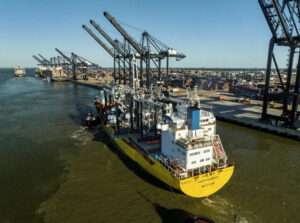The Oakland Board of Port Commissioners has approved a fiscal year 2024 (FY24) budget of $558 million.
The port’s fiscal year began 1 July 2023, and goes through 30 June 2024.
The approved budget outlined critical components for the Port of Oakland’s future including:
- An anticipated $16 million revenue increase in FY24.
- Approval of a $163.7 million capital budget.
- Allocation of $245.2 million over five years to fund the Port of Oakland’s electric infrastructure and support zero emissions operation goals including funding for Seaport Air Quality 2020 and Beyond Plan projects.
The Port of Oakland projects a modest 3 per cent growth in container cargo activity at the Oakland Seaport.
“As a key global gateway on the US West Coast, the Port of Oakland continues to grow its role as a centre of innovation for emissions reductions by making major investments in the port’s capital programme,” said Oakland Board of Port Commissioners’ President, Barbara Leslie.
“The port’s commitment to a zero emissions future is necessary in moving our port forward in the best interests of all of our stakeholders and community.”
READ: Port of Oakland turning basins project progresses
“The critical investments approved by our Port Commissioners highlight the work we are all doing to ensure we are building a sustainable future for the next generation,” said Port of Oakland Executive Director, Danny Wan.
“The Port Board’s budget approval sets us on an infrastructure path that will have lasting economic and environmental benefits for Oakland and the region.”
The Port of Oakland said it anticipates a $16 million operating revenue increase in FY24.
In FY22, the Aviation division generated approximately 47.3 per cent of the port’s total operating revenues.
At the Oakland Seaport, 94 per cent of TEU that moved through the port in the calendar year 2022 were associated with international trade.
The port cautioned that its businesses must remain vigilant, flexible, and adapt as situations warrant in the future, due to unanticipated factors that may adversely impact passenger traffic at Oakland International Airport or cargo activity at the Oakland Seaport.
READ: Port of Oakland re-elects Board President
The Port’s Commissioners approved a $163.7 million capital budget for the next fiscal year.
These investments in capital programmes represent a 45.6 per cent year-over-year increase strengthening the port’s vision of building for the next generation.
Furthermore, the capital budget highlights the work being done today for the port’s future and the region.
Most of the spending is earmarked for Oakland International Airport and the Oakland Seaport, including the advancement of projects for green technology innovations and climate change resilience.
For instance, the long-time programme to reduce pollutants from stormwater discharge, projects addressing sea level rise, and efforts supporting the port’s road to zero emissions operations.
The port’s five-year capital improvement plan, an estimate of future capital spending, is projected to be $1.4 billion.
A total of $245.2 million over the next five fiscal years is planned to upgrade the port’s electric infrastructure system and advance zero emissions initiatives including investments in projects that are part of the Seaport Air Quality 2020 and Beyond Plan.
Projects included in the capital budget from the Seaport Air Quality 2020 and Beyond Plan include:
- Expanding electric charging facilities.
- Launching the Green Power Microgrid project.
- Partnering with Matson Terminal to convert all cargo handling equipment from diesel operations to zero emissions technologies.
This dedicated budget is consistent with the port’s recent decarbonisation efforts.
Less than three weeks ago, the California Transportation Commission (CTC) voted to award a $42 million grant to the Port of Oakland for its Green Power Microgrid Project.
Additionally, earlier this July the Port of Oakland received a $119 million in grant funding from the State of California as part of the Port’s Freight Infrastructure Program (PFIP).









